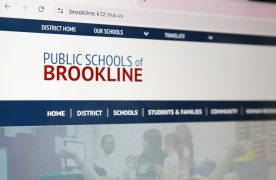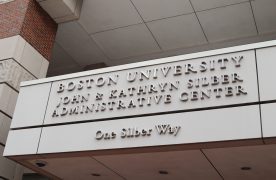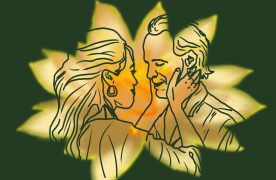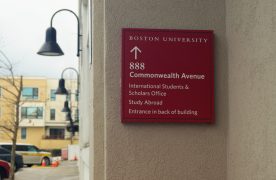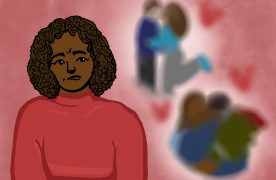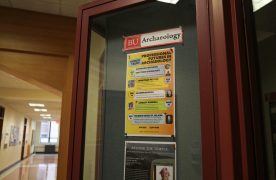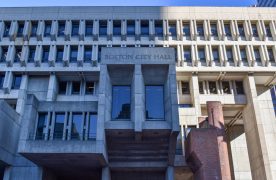Boston University Hillel honored Yom HaShoah, also known as Holocaust Remembrance Day, on Tuesday with an event that included reading names of Holocaust victims and sharing stories of survivors.
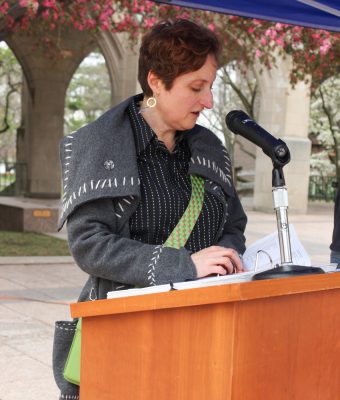
The reading of the names lasted from 9 a.m. to 5 p.m. and featured 43 students and faculty members who read names of Holocaust victims in 10-minute shifts throughout the day.
Steven Katz, a Boston University professor of religion, said the live reading of the names aimed to give Holocaust remembrance day a “personal face” and a “human touch.”
“People hear a name [and] it’s like their friends, it’s like their parents, it’s like themselves,” Katz said. “The name makes it real in a way that just talking about big numbers doesn’t.”
Katz said the influence of the Holocaust is broad and we have a lot to learn from it.
“It shows the levels of human criminality, it shows the depths in which human beings can sink [to] and also we find … instances of great courage and heroism,” he said. “It’s a story about human nature and all the generalizations we make about human nature … we need a deeper understanding of what it is to be a human.”
Katz added that education can play an important role in increasing people’s sensitivity towards others.
“Education, after all, [is] what a university exists for — not only to train people to do STEM, business and work [with] computers, but to be better human beings, to understand human nature [and] to recognize what human society is capable of both on the positive and negative,” Katz said.
Margaret Wallace, associate professor of Film and Television and a speaker at the event, wrote in an email that she “kept thinking of the lives that were cut short.”
“As I was reading the names, I wanted to learn more about who they were and what their lives must have been like,” Wallace wrote. “By setting time aside to focus on these modern historical events, we can reflect on the magnitude of the suffering to honor the memories of those who perished.”
Vijay Fisch, a freshman in the College of Computing and Data Sciences who read names from 12:40 to 12:50, said he is happy to see that BU has a safe place for the Jewish community to “stick together through all of the crises and prejudices” Jewish people face.
“I think that a lot of Jewish students will really appreciate these names being read and some of them might even have an opportunity to read the names of their own family members who were killed during the Holocaust,” Fisch said.
Grace Ye, a sophomore in Sargent College of Health and Rehabilitation Sciences and speaker at the event, said this event served as a reminder of the hatred that still exists toward the Jewish community today.
“Injustice and overall feelings of racial tension [are] something that we continue to struggle with today,” Ye said. “It’s really significant that we hold this event and have a safe place for people to talk about these issues.”
Yudha Situmorang, a masters student at Questrom School of Business and a speaker on Holocaust Remembrance Day, wrote in an email that his impression of this event is profound.
“It was a heartbreaking reminder of the atrocities committed during the Holocaust and the immense suffering that took place,” Situmorang wrote. “At the same time, I felt grateful to be able to participate in this event and honor the memory of those lost.”
Situmorang wrote that participation in the event offered a means of building toward a better future.
“Joining this activity is not just about commemorating the past, but it is also a call to action to ensure that history does not repeat itself,” he wrote.
Akiva Rubin, a sophomore in the College of General Studies, spoke at the event. Rubin said reading the names of Holocaust victims is a way to keep their memories alive.
“The last time someone’s name is forgotten, that’s when they are fully gone,” Rubin said. “On a personal level, each person, no matter who they were, should be remembered.”
Julia DeVoy, a lecturer at Questrom School of Business and a speaker at the event, wrote that these events help people grow a sense of compassion and commitment to social justice.
“This underpins our ability to actually walk the talk,” DeVoy wrote. “The Holocaust Remembrance Day event here will further prepare community members to become more engaged and informed citizens of our world.”






